BRICS Summit in Kazan; PART 1 before the summit
The BRICS leaders’ summit is taking place on October 22-24, 2024, in Kazan (Russia). I refer to my previous article about BRICS: “BRICS overview 2024” July 22, 2024, where the reader can see the progress in 2024 so far. Here is now the new article (PART 1) before the Kazan Summit and the next one (PART 2) will be updated after the Summit.
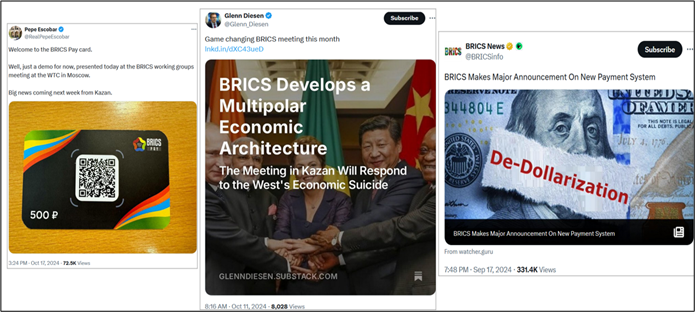
BRICS Pay: Participants of the BRICS forum receive promo cards of the BRICS Pay payment system upon registration. The card already has 500 rubles ($5.13), which can be spent during the forum on October 17-18 in stores with special BRICS Pay markings to test how the system will work in the future.
BRICS – taking momentum
BRICS is gathering momentum as the potential benefits of membership become clearer in the eyes of developing nations (the Global South) and Turkey’s bold decision to apply for membership is a sign of that. Two key moments in the acceleration of BRICS were 2014, when the Ukraine crisis started and 2022, when full blown war broke out.
The weaponization of the global financial system by the west against Russia helped the BRICS countries to flock around the need to create an alternative financial architecture for developing nations. A BRICS bank (now called the New Development Bank was established) to create an alternative to the World Bank. A Contingent Reserve Arrangement was established, providing an alternative to the IMF for countries who need access to a pool of reserves in the face of currency crises. As the Belgium-based Swift interbank communication service has become politicized, so BRICS Pay was created.
The key aim is to reduce dependence on the US dollar for global trade and therefore foreign exchange reserves. Russia and China’s shift to trading oil in yuan, Saudi Arabia’s abandonment of the Petrodollar Pact and the UAE and India’s agreement on trading in rupees are good recent examples of countries choosing to de-dollarize.
While the dollar remains the pre-eminent global trading currency, we should expect to see its share of global trade decline over the coming years. This will pose longer-term systemic risks to the US’s ability to service its vast federal debt, as the cost of borrowing inexorably rises.
Dissatisfaction in developing countries grew about western domination of the international financial system like IMF and World Bank or G7 bloc. It’s not only that developing countries see that the western dominated financial bodies don’t represent their interests. They have also become increasingly politicized, e.g. organizing over 20,000 economic sanctions against Russia.
So, BRICS has emerged as a more appealing meeting point for developing countries. Its values of non-interference, equality and mutual benefit mean countries with troubled relationships can come together to strengthen relations through mutually-beneficial economic ties.
From the view point of the Global South/developing countries, there are many interesting and promising features found in the formation of BRICS:
- The China, Russia, India triangle, which over history time has been beset by tension and conflict, are now cooperating in the bloc
- Iran and Saudi Arabia joined BRICS in 2024, almost unthinkable a few short years ago, but made possible by a gradual thawing in their relations brokered by China in 2023
- Pakistan is now looking to join BRICS, despite India’s prominent founding role in the group
- It’s therefore no surprise that Turkey, which is also a NATO and G20 member, has turned to BRICS after decades of trying to join the European Union
- This gradual rapprochement through trade and political cooperation should be applauded, from the view point of the Global South
A prominent NATO member state, Turkey, can enjoy a less antagonistic relationship with the developing world. The very point of BRICS is that countries aren’t required to choose one side against another. There is a long list of other countries who wish to join BRICS. Before the end of this decade, BRICS will represent a majority of the global population.
The US, the EU and the UK will continue to be powerful players but their influence on developing countries and their dominance of the global financial system, seems to wane as BRICS forges a more multipolar world over the longer term.
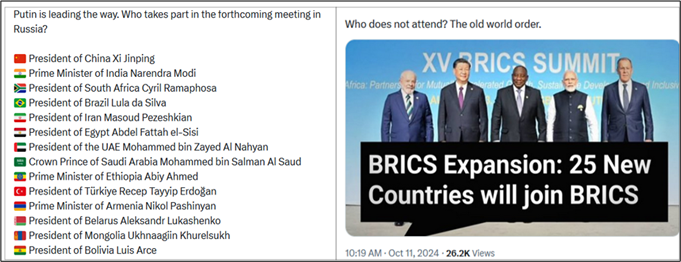
The essence of BRICS
The idea of BRICS began as a worldwide investment opportunity, since it comprised some of the world’s fastest growing economies — Brazil, Russia, India, China and South Africa. They belonged to four continents and the fact that all of them were non-Western economies gave them a geopolitical identity as “the leading lights” of the developing world.
Even after its expansion in January 2024 with the addition of Saudi Arabia, Egypt, the United Arab Emirates, Ethiopia and Iran (Argentina expressed initial interest in joining but subsequently opted to withdraw), the core purpose of what BRICS seeks to achieve lacks clarity.
BRICS’ statements critical of the governance of multilateral institutions and groupings indicated that the grouping was seeking changes in global governance. With the establishment of the BRICS bank, New Development Bank, it appeared that these rising powers from the Global South were perhaps seeking to create an alternate global order.
A joint statement of the BRICS Ministers of Foreign Affairs/International Relations issued in Nizhny Novgorod, Russia on June 10, 2024, offers more substantial insights into BRICS’ vision not for an alternate but a reformed global order. The 54 carefully articulated points address issues ranging from international security, sustainability and climate change, human rights, the conflicts in the Middle East and Ukraine, and the position of Africa in the world, among many others. The joint declaration constitutes, so far, the clearest statement produced by BRICS showcasing their shared vision and worldview beyond economic cooperation. We now have a much better idea of what BRICS wants.
There is a significant need to consider the structural inequalities of the global order in the BRICS’ perception of the world. This idea is clearly manifest in the proposal of “a more agile, effective, efficient, responsive, representative, legitimate, democratic and accountable international and multilateral system,” which is supposed to lead to a “greater and more meaningful participation of developing and least developed countries, especially in Africa, in global decision-making processes and structures and making them better attuned to contemporary realities”.
BRICS nations are united in their perception that despite changing geoeconomic and geopolitical realities their voices remain marginalized and real power in multilateral institutions is in the hands of the Global North. Today in purchasing power terms BRICS has a greater share of the global GDP (32 percent) than the G-7 nations (31 percent). The balance of economic power is moving away from the Trans-Atlantic to the Indo-Pacific region.
However, the power over institutions of global governance remains centralized in the Global North. This ensures that rules that govern the global economy are skewed in favor of the north at the expense of the Global South.
BRICS appear to be committed to a multilateral order in which institutions play a central role in the decision-making process. The statement rejected unilateralism and unilateral actions as outside the UN Charter and in breach of international law. The statement blamed unilateral sanctions for having a negative effect on trade, health, energy supplies and food security of the developing world.
The joint declaration of the BRICS ministers opens the door to brand sanctions by the United States, the European Union and allies as incompatible with international law. The joint declaration in the same vein also condemned unilateral, punitive and discriminatory protectionist measures that disrupt the global supply chains and distort competition.
The key to the success of the BRICS is the rapid decline of the current global order. BRICS are unhappy with the systemic bias against the Global South in the current global order but they are not seeking to establish an alternate order but strengthen and reform the current one such that mutually agreed upon norms are applied equally and justly to all nations.
The BRICS forum promises a new multipolar world order, where the Global South truly matters. It seeks to achieve that goal through reform not replacement of the existing order. Forums such as G-20 can be the vehicle for the reforms that BRICS seek. But there are internal conflicts such as those between India and China and Saudi Arabia and Iran and to a lesser extent Egypt and Ethiopia, which reduces the forum’s ability to act more decisively.
BRICS will have to either limit its membership to nations that are not hostile to each other or develop a robust internal system of conflict resolution. But the fact that BRICS has emerged and is being taken seriously clearly indicates that there is a need and an active demand for change and for the moment there is no better hope than BRICS to bring about that change.
BRICS security initiatives. China’s Foreign Minister Wang Yi proposed four BRICS-centric security initiatives, BRICS+ should aim at: peaceful coexistence, independence, autonomy and true multilateralism, which implies a rejection of exceptionalism (the US). At the BRICS table, the overarching theme was how member-nations should support each other despite so many external challenges.
China’s increased power is reflected in every major geoeconomics move: from the RCEP (Regional Comprehensive Economic Partnership), a mega inter-Asia free trade agreement (FTA) to the countless ramifications of Belt and Road Initiative (BRI) projects, and all the way to BRICS+ cooperation. The future of all Global South nations involved spell out getting closer and closer to China.
Putin has stressed that the Russia-China strategic partnership is in favor of a just world order, a principle supported by the Global South. Geoeconomics is key and the development of the International North South Transportation Corridor (INSTC) was confirmed as a top Russia-Iran priority.
The new pan-Eurasian security system proposed by Putin was discussed in detail at the latest Shanghai Cooperation Organization (SCO) summit. Putin actually stated that a “decision was made to turn the SCO regional anti-terrorist structure into a universal center tasked with responding to the entire range of security threats.”
It all started with the concept of “Greater Eurasian Partnership”, which Putin advanced in late 2015. That was refined during his annual address to the Federal Assembly last February and then, in a meeting with key Russian diplomats in June, Putin stressed that the time was right to kickstart a comprehensive discussion of bilateral and multilateral guarantees embedded in a new vision for collective Eurasian security.
For a long time, the Western media maintained a silence on the subject of BRICS. Some interest appeared, when Turkey expressed interest in joining BRICS.
Gold, national currencies and de-dollarization
In a seismic shift that’s shaking the foundations of global finance, BRICS nations and their new allies are amassing gold at an unprecedented rate, leaving Western investors scrambling to catch up. Although the West is showing signs of awakening, with growing ETF inflows in September, many warn it’s too little, too late. As inflation rates soar and economic instability looms, the stark reality of gold’s timeless value is becoming impossible to ignore.
With this expansion, BRICS+ now represents over 40% of the global population, positioning itself as a powerful counterweight to the Western-dominated financial system. The BRICS alliance has stated more than 30 different countries have expressed interest in joining the economic government conglomerate and leadership continues to consider adding more nations to the roster.
Gold has become a central tool in the coalition’s strategy to challenge the economic dominance of the West. As BRICS+ nations increasingly turn to gold to diversify their reserves and hedge against inflation, the bloc signals its intent to reshape global trade and finance. This expanded coalition, with its diverse economic powers, is united in its goal to reduce Western influence and build parallel financial structures. All eyes are on the upcoming Kazan summit, which will begin Oct. 22. At this summit, the BRICS+ nations will outline their next steps.
Western investors are waking up to gold’s enduring value as a safe haven. But financial experts warn that this realization may have come too late. While Western markets are just now seeing a rise in gold-related investments, the BRICS nations have been quietly stockpiling gold for years.
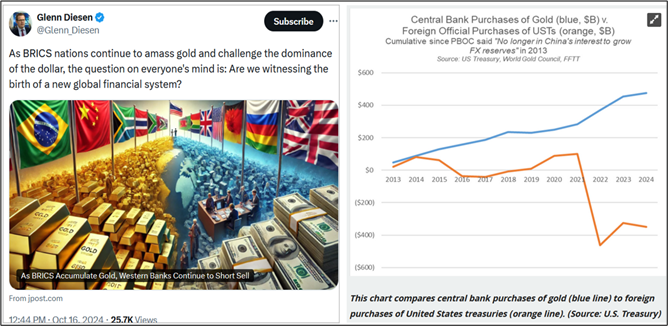
The strategic foresight of countries like China, Russia, and India has positioned them far ahead in the global race for gold.
Market analysts describe this as an unprecedented transfer of wealth. Asian investors, particularly in China and India, are acquiring physical gold at rates never seen before. Many view this surge as a clear sign of waning confidence in the Western financial system.
The West’s financial instability makes the use of Western currencies to keep reserves very risky, Russian Finance Minister Anton Siluanov said.
“The policy of countries issuing the so-called reserve currencies, including the dollar, certainly, gives rise to many questions. Their budget deficits are growing and their national debt is increasing. In the United States, for example, it is already about 120% of GDP. All of this is done without any restrictions, and we and our G20 colleagues are asking ourselves: what are the prospects for these countries?”
The process of de-dollarization cannot be stopped, with countries thinking how to make themselves safe, Russian Foreign Minister Sergey Lavrov said at a news conference in the UN after presiding over Security Council meetings as its chairman.
“All are trying to make themselves safe. Information leaked not long ago that in the environment when the United States and the whole collective West want to steal Russian money, Saudi Arabia is thinking how to reduce dependence on the dollar. The process of de-dollarization is underway, it cannot be stopped,” he said.
Meanwhile, finance ministers and heads of central banks of BRICS nations are involved in the initiative on the creation of alternative payment systems, Lavrov noted, adding that recommendations are expected to be present by the summit in Kazan. “For example, President Lula da Silva actively promoted the idea of creating alternative payment platforms, payment and account settlement mechanisms within BRICS at last year’s BRICS summit.
BRICS finance ministers and heads of central banks are involved in it, with some recommendations to be present by the summit as well,” he said. Issues of reforming the IMF and the WTO are also on the agenda of the BRICS summit in Kazan, the minister stressed.
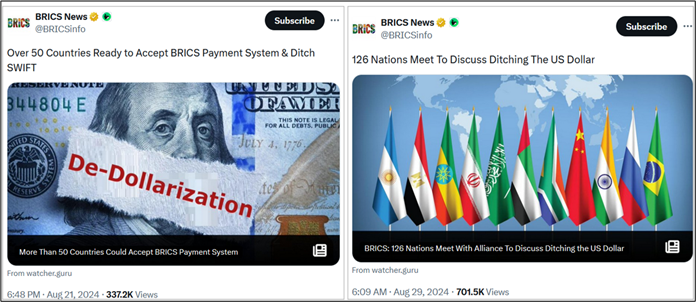
New currency, new payment system
The BRICS countries are developing a wide range of instruments for creating an inclusive international financial system, some of them will be announced this autumn at the summit in Kazan, Andrey Mikhailishin, the head of the task force on financial services of the BRICS Business Council, told.
He also confirmed that a list of projects has been determined, which a common unit of account (Unit), a platform for international settlements in BRICS digital currencies (Bridge), a payment system (Pay), a settlement depository (Clear), an insurance system (Insurance), and a BRICS rating alliance.
The key principles in designing the new financial system are decentralization of international interaction and the use of digital technologies. In particular, Mikhailishin noted that BRICS Clear will “use blockchain to record securities and exchange them.”
The design of a common unit of account uses the experience of the transferable ruble of the countries of Comecon (The Council for Mutual Economic Assistance of the countries of the former Soviet bloc). “When we talk about a counterpart of the transferable ruble, we mean that settlements but not the storage of balances are made in national currencies,” he explained.
The Unit project assumes that the value of the common unit of account is pegged by 40% to the value of gold, and by the remaining 60% to a basket of national currencies of the BRICS countries. This approach can make it a convenient and universal instrument, Mikhailishin said: “When you have a unit of account that can be converted into any national currency, it is more convenient for you to hold it, since it is a more liquid instrument,” he said. A common unit of account would solve the problem of exchange rate volatility that occurs when cash balances accumulate from settlements in national currencies.
BRICS is working towards the creation of a new payment system without the integration of the US dollar in its mechanism, confirmed Russian Foreign Minister Sergey Lavrov. The minister added that the new payment system will not only be used to settle cross-border transactions, it will act as a complete financial set-up.
The development, when launched, could attract emerging economies towards it making a shift away from the US dollar. The new BRICS payment system could lead to a paradigm shift in the global financial sector. Read here to know how many sectors in the US will be affected if BRICS ditches the dollar for trade.
New BRICS Payment System to include trading, investing & settlements. The Russian minister revealed that the new BRICS payment system will be equipped with trading, investing, and along with trade settlements. He explained that the mechanism will allow countries to partake in financial operations without being dependent on the US dollar. The move will make the alliance’s quest of de-dollarizing their economies much stronger.
Lavrov also hit out at the US and Europe for pressing sanctions on countries they don’t like. He stressed that the sanctions are what led to BRICS decision on launching a new payment system. Even US Treasury Secretary Janet Yellen acknowledged that the White House sanctioning developing nations led to de-dollarization.
“Many are attracted by the fact that payment systems are being developed within BRICS. Which allows trading, investing, carrying out other economic operations without being dependent on those that decided to weaponize the dollar and the euro,” the foreign minister said.
The minister added that developing nations will flock to the BRICS payment system in fear of US sanctions. “Everyone understands that anyone may face US or other Western sanctions,” he said during a meeting with Egyptian counterpart Badr Abdelatty.
From a payment system to an alternative to the IMF: Russia’s proposals for the BRICS summit, to be held in Kazan on October 22-24. Russia will present a number of initiatives that destroy the global dominance of the West:
- Creation of an alternative payment system in the national currencies of the BRICS countries, including a network of national banks linked to each other through the central banks of the countries
- BRICS Clear, a single platform for trading national securities of the participating countries
- BRICS Insurance, insurance services for members of the association, including cargo transportation insurance
- BRICS Reserve Fund, an alternative to the IMF, a mechanism for financial support for the participating countries
- BRICS Grain Exchange, a pricing agency and trading platform for grain and other basic food products, an alternative to Western exchanges
- Development of a common methodology for credit ratings and building cooperation between national rating agencies
- The BRICS countries today account for more than a third of the world economy, the association is becoming a powerful counterweight to the West in world politics and trade
Russian Foreign Minister Sergey Lavrov said BRICS countries are developing a payments platform that will allow them to bypass the US dollar. The initiative came from a summit of the BRICS countries in Johannesburg last year where the group — which includes the key members of Brazil, Russia, India, China, and South Africa — called for more trade and lending in their national currencies. The platform will improve the international monetary system and allow payment in national currencies for mutual trade. Russia is keen to move its trading partners away from the dollar because it faces significant sanctions from the US and its allies.
The US government cannot print its way out of this mess because the only value that it derives from the dollar is based on global demand. When no one wants its trash anymore, it becomes just that.
New potential applicants and members
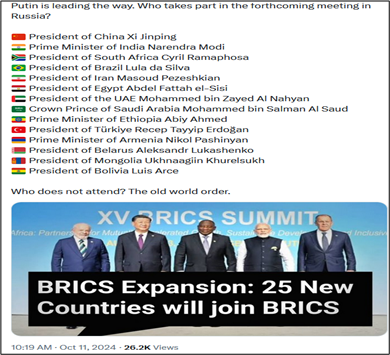
Syria has applied to join BRICS, said the country’s ambassador to Russia, Bashar Jaafari. “We are very interested in joining BRICS. We have sent written requests to join the organization,” he told on the sidelines of the conference called North Caucasus: New Geostrategic Opportunities.
Serbia intends to join BRICS. It views this option as an alternative to the European Union since the country does not see the EU as a partner. More and more countries understand that BRICS is a prospect and guarantee of a multipolar world.
Malaysia sent a letter to the Russian Federation with an application to join BRICS, expressing its readiness to become a strategic partner of the organization. “This potential membership holds substantial promise for both nations and underscores our commitment to fostering robust international collaboration,” said Prime Minister Anwar. By joining BRICS+, Malaysia aims to deepen economic cooperation with emerging markets, enhancing trade, investment, and technological exchange. This engagement complements Malaysia’s existing relationships with Western nations and institutions, rather than replacing them. BRICS+ provides a platform for Malaysia to achieve its developmental goals.
Azerbaijan has officially applied for BRICS membership, the country’s foreign ministry spokesman, Aykhan Hajizada, said. “Azerbaijan has filed an official application for joining BRICS,” Azerbaijan’s Report news agency quoted him as saying. Baku’s intention to join BRICS was reflected in a joint declaration on strategic partnership between Azerbaijan and China, which was signed on the sidelines of the Shanghai Cooperation Organization (SCO) summit in Astana in early July.
Turkey (Turkiye) applies to join BRICS
Due to the fundamental importance of the matter, it is discussed in more detail here. Turkey joining BRICS represents another step to a multipolar world.
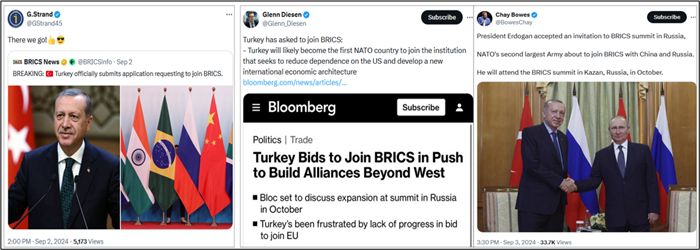
Turkey has officially applied to join the BRICS, Bloomberg reported on September 2, citing people familiar with the matter. Ankara would be the first NATO member state to join the BRICS economic alliance that has been dubbed the alternative to the US dominated world of international trade.
According to the news agency, Turkey is trying to strengthen its influence in the world and expand relations with developing countries. In addition, interest in BRICS arose in connection with the lack of progress in joining the European Union and against the backdrop of disagreements with NATO allies.
Bloomberg said that the country’s President Recep Tayyip Erdogan believes that the West is losing its position as the geopolitical center and is interested in developing relations with various players of the multipolar world. According to the news agency, the issue of expanding the association may be considered at the upcoming BRICS summit, which will be held in Kazan on October 22-24.
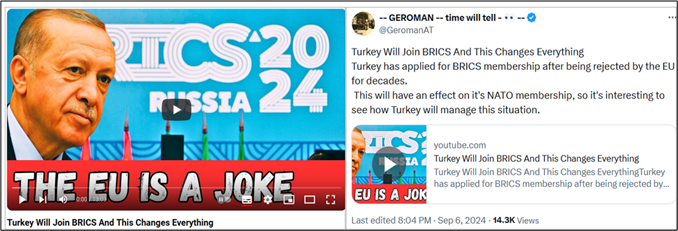
Turkey Will Join BRICS And This Changes Everything
Sebastian Sas, September 6, 2024
BRICS is gathering momentum as the potential benefits of membership become clearer in the eyes of developing nations (the Global South) and Turkey’s bold decision to apply for membership is a sign of that.
It’s therefore no surprise that Turkey, which is also a NATO and G20 member, has turned to BRICS after decades of trying to join the European Union. A prominent NATO member state, Turkey, can enjoy a less antagonistic relationship with the developing world. The very point of BRICS is that countries aren’t required to choose one side against another. There is a long list of other countries who wish to join BRICS, including Mexico, Nigeria, Bahrain, Pakistan, Thailand and Vietnam. Before the end of this decade, BRICS will represent a majority of the global population.
Turkish Foreign Minister Hakan Fidan, during a two-day BRICS foreign ministers summit held in Nizhny Novgorod, Russia on June 11, 2024, stated that Türkiye’s engagement with BRICS could help increase its exports to member countries, which is crucial given the dominance of Western markets in its export portfolio. By diversifying its trade relations, Türkiye could reduce its economic vulnerabilities in the long run. Establishing long-term, stable relationships with BRICS members could help Türkiye navigate the volatility of the global economy, disrupted supply chains, and geopolitical tensions between major powers
Türkiye’s recent bid to join the BRICS group has sparked discussions about the potential implications for the country’s foreign policy direction. Türkiye’s interest in the organization is not new—it dates back to 2018. At the BRICS summit that year, Turkish President Recep Tayyip Erdogan, attending as a special invitee, expressed the country’s desire for membership. However, there was little follow-up regarding Ankara’s strategy toward the group.
Joining BRICS will enhance Türkiye’s role as a bridge. Türkiye’s growing interest in BRICS stems from both political and economic motivations. Politically, BRICS represents the increasing influence of emerging nations, offering a platform for these countries to voice their dissatisfaction with the current global system. The group positions itself as a counterbalance to the West-dominated international order. As a major regional power, Türkiye’s interest in BRICS aligns with its multi-vector and balanced foreign policy. Joining BRICS could enhance Türkiye’s role as a bridge between the East and West, increasing its strategic importance to both sides.
Strengthening ties with BRICS could help Türkiye navigate the uncertainties of the global system while pursuing its national interests independently of any single bloc. Another critical aspect of BRICS is its critique of existing international institutions, particularly the unequal distribution of power in organizations like the International Monetary Fund (IMF) and World Bank. Emerging economies within BRICS have long expressed frustration with their underrepresentation and limited voting power in these institutions.
Furthermore, Türkiye’s interest in BRICS fits with its broader strategy of engaging with alternative international and regional organizations. This approach is consistent with its bid to join the Shanghai Cooperation Organization (SCO) and its status as a dialogue partner of the Association of Southeast Asian Nations (ASEAN). The overarching goal is to collaborate with other emerging economies to shape international affairs and promote a multipolar world order. By engaging with non-Western organizations, Türkiye seeks to improve its strategic autonomy, compartmentalizing its relationships with Western organizations and assessing diverse opportunities on both fronts.
What will joining BRICS bring to the Turkish economy? Economically, BRICS plays a pivotal role in the global economic system. Since the 1990s, rapid development in Asian economies has shifted the center of economic gravity from the Euro-Atlantic to the Asian region. BRICS members account for 40% of the world’s population and 20% of its gross domestic product (GDP). Following the 2024 expansion, BRICS now represents 46% of the global population and 31% of the world economy. Türkiye’s engagement with BRICS could help increase its exports to member countries, which is crucial given the dominance of Western markets in its export portfolio. By diversifying its trade relations, Türkiye could reduce its economic vulnerabilities in the long run.
Additionally, improving relations with BRICS members could attract new investments, create job opportunities, and expand the presence of member countries in various sectors of Türkiye’s economy. This is particularly significant as the world shifts from a West-centered economic order to an East-centered one. Establishing long-term, stable relationships with BRICS members could help Türkiye navigate the volatility of the global economy, disrupted supply chains, and geopolitical tensions between major powers.
Another key aspect of BRICS is its support for alternative international financial institutions, such as the BRICS New Development Bank (NDB). Türkiye’s deepening ties with BRICS could facilitate access to funding from the NDB for renewable energy and infrastructure projects, complementing financing from Western multilateral development banks.
In summary, Türkiye’s interest in BRICS is driven by both political and economic factors. Its proactive foreign policy, emphasizing a balanced approach between East and West, forms the political rationale. On the economic side, the growing clout of BRICS countries offers Türkiye opportunities to deepen its trade relations, access new export markets, and attract diversified investment sources for long-term growth.
Putin meets the leading media outlets from BRICS countries
Russian President Vladimir Putin will meet with the heads of the leading media outlets from BRICS countries on Friday, on October 18, the Kremlin press service said. The meeting will take place ahead of the group’s summit, set to be held in the Russian city of Kazan on October 22-24.
The Russian leader holds regular meetings with the media, including foreign news outlets. He last fielded questions from the heads of international news agencies at a TASS-hosted event on the sidelines of the St. Petersburg International Economic Forum in June. In February, the Russian president gave a two-hour interview to US journalist Tucker Carlson. Also, this year, he gave a written interview to the Xinhua news agency ahead of a state visit to China in May and another written interview to Mongolia’s Onoodor newspaper ahead of a trip to Ulaanbaatar in September. Besides, Putin often briefly talks with reporters on his foreign trips and answers the media’s questions during visits to Russian regions. The head of state traditionally holds an end-of-year press conference in December.
Russian Presidential Aide Yury Ushakov said earlier that Putin was also expected to address the BRICS Business Forum on October 18. Ushakov added that there would also be video addresses by a number of heads of state.
The main statements of Vladimir Putin at the meeting with the media of the BRICS countries, which lasted two hours:
- BRICS already covers 33% of the land and 45% of the population of the planet;
- Russia “will not allow under any circumstances” the appearance of nuclear weapons in Ukraine;
- In the relations between Russia and China, “there are no elders or youngers”;
- Russia has “simply unlimited” energy resources;
- The United States is “15 years late” and will not be able to stop the development of China, just as it is impossible to stop the sunrise;
- The Palestinians will not leave their land;
- BRICS is not a “bloc organization” and is useful, including for countries that are not part of it;
- The BRICS countries are working on their own analogue of SWIFT;
- Many countries in the world do not recognize the ICC, this organization does not have universal significance;
- Putin said that he will not go to the G20 in Brazil this year so as not to disrupt the summit;
- NATO is fighting Russia with the hands of Ukrainian soldiers; Kiev does not spare its military in the interests of third countries;
- Russia is ready to continue the armed struggle, “victory will be ours”.
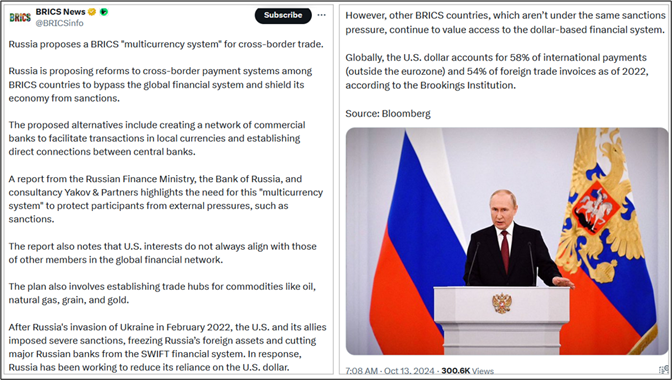
BRICS summits before Kazan
Russia’s BRICS chairmanship plan for 2024, which includes around 250 events, has been 80% implemented so far, according to Russian Presidential Aide Yury Ushakov, who heads the organizing committee for preparing and overseeing Russia’s chairmanship in the association.
“The schedule of events for the year includes about 250 meetings, forums, and other thematic events. The plan has been 80% implemented,” Ushakov said, noting that approximately 200 events have taken place in 13 Russian cities. “The plan was primarily focused on ensuring the smooth integration of the new BRICS member states into the cooperation within our association and their adaptation to the established BRICS culture,” Ushakov emphasized. On January 1, 2024, Egypt, Iran, the United Arab Emirates, Saudi Arabia, and Ethiopia officially joined BRICS.
Ushakov highlighted the BRICS Foreign Ministers’ Meeting and the High Security Representatives’ Meeting as some of the most significant political and security events that have taken place. He also noted the meetings of ministers in the areas of economy, energy, education, science, culture, and sports. Additionally, he mentioned the BRICS Games, the BRICS Film Festival, the Fashion Forum, the first-ever Tourism Forum, and discussions on environmental issues.
“The sixteenth BRICS summit scheduled for 22-24 October in Kazan is the culmination of the Russian shift in BRICS, in this crucial international association,” the Russian leader’s aide pointed out. He added that the Kazan summit will be the first such event for the expanded association.
The 6th International Municipal BRICS Forum will be held in Moscow’s Expocenter on August 27-28, 2024, the press service of the Moscow Department of Foreign Economic and International Ties said. “The forum will be the largest international floor, where representatives of government authorities and the business will share the advance experience and discuss key issues of municipal cooperation,” the press service said.
Delegations from 126 countries are expected to take part in the forum along with representatives of Russian regions. More than 5,000 participants from 500 cities of the world will discuss current economic problems, digital technology spheres, environment, municipal infrastructure, transport, healthcare, education, and culture.
The BRICS security summit, September 11- 12, in St. Petersburg. The BRICS security summit chaired by Russian Security Council Secretary Sergey Shoigu will discuss the parameters of the future world order. The forum will also discuss support for multipolarity and the right of nations to choose their own path of development, as well as reforming the global political and financial-economic governance systems.
According to the preliminary agenda, the representatives of the BRICS group, chaired this year by Russia, intend to talk about how to work together to counter the “rules-based order” imposed by the West. It is noted that BRICS representatives are particularly interested in dialogue with the countries of the Global South that aspire to conduct an independent policy based on state sovereignty.
Earlier, the 14th meeting of BRICS high representatives in charge of security kicked off in St. Petersburg. The event, chaired by Shoigu, is attended by representatives from Russia, China, Brazil, India, South Africa, as well as from Egypt, the UAE, Iran and Ethiopia. Kremlin Spokesman Dmitry Peskov said that Russian President Vladimir Putin may hold a meeting with the BRICS representatives participating in the event.
Russia and China, as well as partner countries of the global South, adhere to the idea of a world order based on the principles of justice, sovereignty and international law, Russian President Vladimir Putin said at a meeting with China’s visiting Foreign Minister Wang Yi.
“Russia and China jointly uphold the principles of a just and democratic world order based on international law, sovereignty and equality. The same approach is shared by like-minded countries in the global South and the world majority, of which the BRICS summit was a fresh confirmation,” Putin said.
Putin recalled that the relations of comprehensive partnership and strategic cooperation between Russia and China were mutually beneficial and equitable for many years. He added that on October 2, the two countries would mark 75 years since the establishment of diplomatic relations.
While security was being discussed in St. Petersburg, China was hosting the BRICS Forum on Partnership on New Industrial Revolution 2024 in Xiamen, in Fujian province.
BRICS Summit, participants
Russia holds the rotating BRICS chairmanship in 2024. The Kazan summit will be the first one for the group’s new member states. Until recently, BRICS consisted of Brazil, India, China, Russia and South Africa. Egypt, Ethiopia, Iran, Saudi Arabia and the United Arab Emirates became full-fledged members of the group on January 1, 2024.
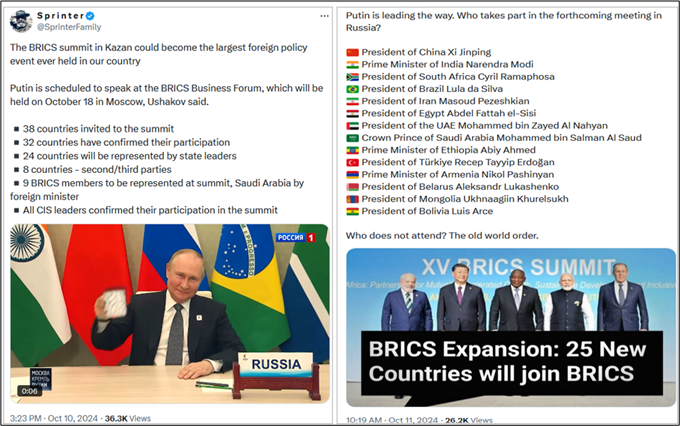
Presidential Aide Yuri Ushakov: The BRICS summit in Kazan could become the largest foreign policy event ever held in Russia. 38 countries have been invited to the BRICS summit, 32 of which have already accepted the invitations.
Other statements: In one format or another, 34 countries are interested in joining BRICS; Currently, BRICS includes 10 countries: Brazil, Russia, India, China, South Africa, Egypt, Iran, United Arab Emirates, Saudi Arabia, Ethiopia;
The “top ten” countries account for over 30% of the Earth’s land area, 45% of the world’s population, over 40% of the total volume of oil production, and about a quarter of the world’s goods exports; By 2028, the GDP of the BRICS member countries in PPP terms will account for 37% of the global total.
The motto of the Russian chairmanship is “Strengthening multilateralism for equitable global development and security”; BRICS is gradually, brick by brick, building a bridge to a more democratic and just world order; The plan of events for the Russian presidency is primarily aimed at ensuring the smoothest possible entry of new states. It includes about 250 meetings, forums, and other thematic events, and by mid-October it has already been implemented by 80%.
According to the Kremlin aide, along with the leaders of the nine member states, invitations were sent to the leaders of the CIS countries, countries holding the presidency in influential regional integration associations in Africa, Latin America, the Middle East, and southeast Asia, as well as of many countries seeking to become members or collaborate with BRICS.
This year, in his words, is very important for Russia’s presidency. “For the first time, we are presiding over an extended format, which includes not just five but actually nine BRICS countries.
Ushakov, who chairs the organizing committee for the BRICS summit in Kazan, said that the committee’s latest meeting took place on August 21 to sum up the results of Russia’s presidency in the past six months. “More than 60% of scheduled events have been implemented. Some 140 events were held in 13 Russian cities and abroad. The largest of them were the BRICS Parliamentary Forum, BRICS Interparty Forum, meetings of the BRICS education, sports, and transport ministers, prosecution services, supreme courts chairmen, audit services.
The keystone event of our presidency was a meeting of the BRICS foreign ministers and BRICS+ session on its sidelines, which was attended by delegates from countries of the global South and East. This meeting was held in Nizhny Novgorod on June 10 and 11,” he said.
“We think that the launch of new cooperation formats can be seen as a major achievement of our presidency. Thus, the first meetings of the BRICS transport ministers and chief of geological services, as well as the first BRICS forum on nuclear medicine were organized. Cultural and humanitarian areas of cooperation are also developing,” he added.
The next update article will be “BRICS Summit in Kazan; PART 2 after the summit”


